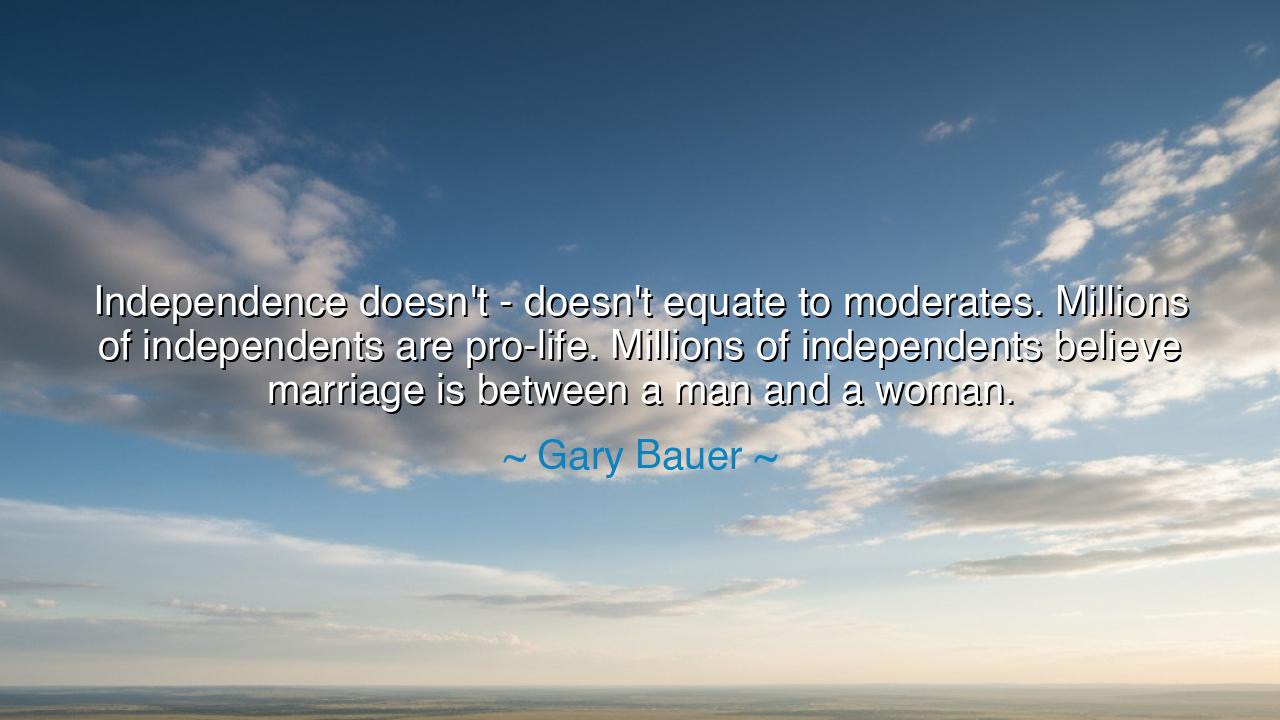
Independence doesn't - doesn't equate to moderates. Millions of
Independence doesn't - doesn't equate to moderates. Millions of independents are pro-life. Millions of independents believe marriage is between a man and a woman.






“Independence doesn’t — doesn’t equate to moderates. Millions of independents are pro-life. Millions of independents believe marriage is between a man and a woman.” Thus spoke Gary Bauer, a man of deep conviction, whose words cut through the fog of political generalization to reveal a timeless truth: that independence is not neutrality, and freedom of thought does not mean absence of belief. In this statement, he seeks to awaken understanding — that the independent spirit, whether in politics, faith, or life, does not dwell in the lukewarm middle, but in the fierce courage to choose one’s path without fear of the crowd.
The origin of this quote lies in the turbulent world of American politics, where labels often imprison more than they define. Gary Bauer, a conservative leader and advocate for faith-based values, spoke these words to challenge the notion that independent voters — those unaffiliated with any political party — are necessarily moderate or undecided. In truth, he argued, independence often signifies a deeper, more personal conviction — one that transcends party lines and speaks to conscience. To be independent, in his view, is not to abandon principles, but to claim ownership of them. His words carry the weight of a lesson as old as democracy itself: that the freedom to think is sacred, but it demands responsibility.
In the ancient world, this wisdom would not have been strange. The philosophers of Athens, though surrounded by schools of thought, were often lone seekers of truth. Socrates, condemned for questioning the certainties of his day, did not choose moderation; he chose integrity. His independence did not make him neutral, but steadfast. Likewise, Bauer’s statement reminds us that the independent mind is not one that drifts aimlessly between extremes, but one that stands firm upon its own reason, even when misunderstood. True independence, then, is not a compromise — it is a declaration of self-governance in thought and moral conviction.
Bauer’s mention of issues like being pro-life or supporting traditional marriage serves not merely as political stance but as illustration: that independence can exist in all corners of belief, not merely at the center. It is a rebuke to the shallow assumption that to be unaffiliated is to be uncertain. Many, he says, walk apart from party banners not because they lack conviction, but because their conscience refuses confinement. This kind of independence echoes the spirit of conscience that moved reformers through history — from Martin Luther, who stood alone against the Church’s authority, to Rosa Parks, who defied the unjust order of her age. Independence is, in every form, the courage to say “I believe,” even when others say “you must not.”
Yet Bauer’s words also warn us of something deeper: the danger of confusing moderation with virtue. There are moments in the life of a people when moderation becomes a cloak for complacency. To seek balance at all costs can lead to moral blindness — for truth does not always lie in the middle, but in the steadfast heart that knows right from wrong. The ancient Romans understood this when they honored those who stood firm in crisis — men and women who chose the harder path over the popular one. True independence, Bauer implies, is measured not by the comfort of consensus, but by the courage to stand apart when the soul demands it.
Consider the story of Winston Churchill, who spent years in political exile for warning of the dangers rising in Europe while others dismissed his fears. He was labeled obstinate, extreme, and divisive — yet when the storm came, it was his independence of thought that saved a nation. Like Churchill, those who live by conviction rather than convenience often pay the price of solitude. But solitude in service of truth is no punishment — it is the hallmark of moral strength. So too, Bauer’s words call us to see that independence is not a halfway house between beliefs, but a fortress built upon conviction.
Let this, then, be the lesson drawn from Gary Bauer’s reflection: that independence is not the absence of belief but its purest form. To be independent is to hold one’s principles as sacred even when they defy the world’s expectations. It is to think with the clarity of conscience rather than the noise of factions. The moderate seeks comfort; the independent seeks truth. One bends with the wind; the other plants roots deep enough to withstand it.
So, to those who would live wisely, hear this counsel: cherish your independence, but do not mistake it for passivity. Let your freedom of thought be joined with courage of conviction. Speak what you believe, even when the echo is small. For the world does not move forward by those who stand in the middle, but by those who stand firm. And remember always: independence is not about walking between two fires — it is about carrying your own flame, and daring to let it burn.






AAdministratorAdministrator
Welcome, honored guests. Please leave a comment, we will respond soon